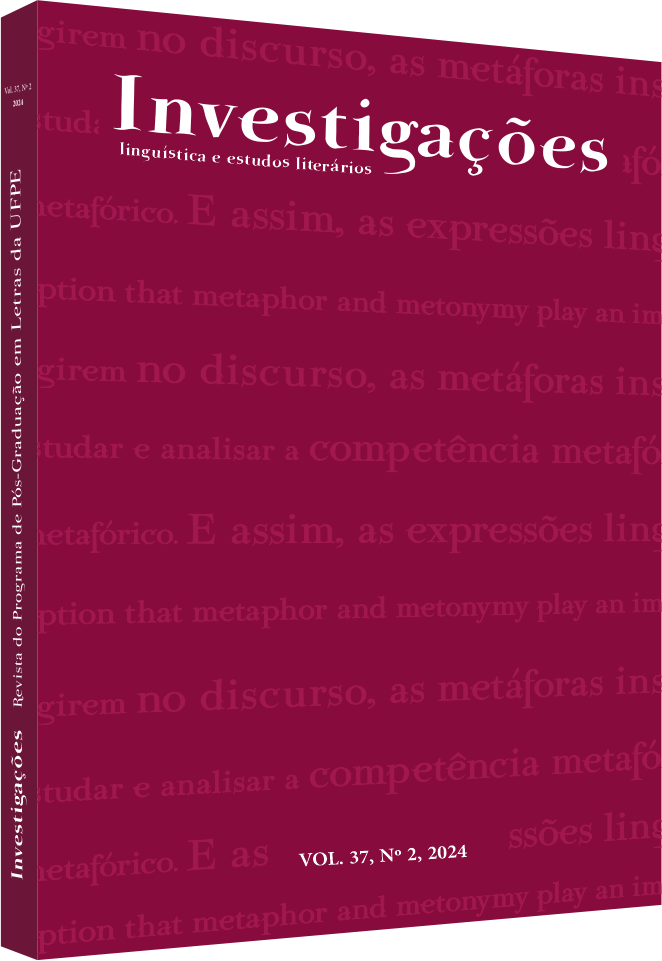Discourse and the Institutionalization of a Field of Investigation: The Case of Grimm and Comparative Grammar
DOI:
https://doi.org/10.51359/2175-294x.2024.259468Keywords:
Grimm, Comparative Grammar, discourse, scienceAbstract
This paper examines the discursive process through which German philologist Jacob Grimm (1785–1863) defends the scientific status of Comparative Grammar. Based on the theoretical and methodological framework of French Discourse Analysis, a paraphrastic matrix was established to explore the historical processes of meaning production attributed to scientific status, in that the defense of this status within a field of study brings to light the relation between the subject of enunciation and history.
References
AMSTERDAMSKA, Olga. Schools of Thought: The Development of Linguistics from Bopp to Saussure. Dordrecht: Reidel, 1987.
AUROUX, Sylvain. Introduction. In: AUROUX, Sylvain. (Org.). Histoire des idées linguistiques, T. I. Liège-Bruxelas: Pierre Mardaga, 1989. p. 13-37.
AUROUX, Sylvain; HORDÉ, Tristan. Les grandes compilations et les modèles de mobilité. In: AUROUX, Sylvain. (Org.). Histoire des idées linguistiques, T. II. Liège-Bruxelas: Pierre Mardaga, 1992. p. 538-579.
AUROUX, Sylvain; BERNARD, Gilles; BOULLE, Jacques. Le développement du comparatisme indo-européen. In: AUROUX, Sylvain. (Org.). Histoire des idées linguistiques, T. III. Liège-Bruxelas: Pierre Mardaga, 2000. p. 155-171.
AUROUX, Sylvain. Les modes d’historicisation. Histoire Épistémologie Langage, Paris, v. 28, n. 1, p. 105-116, 2006.
COURTINE, Jean-Jacques; MARANDIN, Jean-Marie. Que objeto para a Análise do Discurso?. In: CONEIN, Bernard; COURTINE, Jean-Jacques; MARANDIN, Jean-Marie; PÊCHEUX, Michel (Orgs). Materialidades discursivas. Campinas: Editora da UNICAMP, 2016. p. 33-54.
GRIMM, Jacob. Deutsche Grammatik. Göttingen: Dieterichsche Buchhandlung, 1822.
GRIMM, Jacob. De l’origine du langage. Paris: Librairie A. Franck, [1851] 1859.
HAROCHE, Claudine; PÊCHEUX, Michel; HENRY, Paul (1971). A semântica e o corte saussuriano: língua, linguagem, discurso. In: BARONAS, Roberto Leiser (Org.). Análise de Discurso: apontamentos para uma história da noção-conceito de formação discursiva. Araraquara: Letraria, [2007] 2020. p. 17-39.
HENRY, Paul. Os fundamentos teóricos da “Análise Automática do Discurso” de Michel Pêcheux (1969). In: GADET, Françoise; HAK, Tony. Por uma Análise Automática do Discurso: uma introdução à obra de Michel Pêcheux. Campinas: Editora da UNICAMP, 1997. p. 13-38.
INDURSKY, Freda. Unicidade, desdobramento, fragmentação: a trajetória da noção de sujeito em Análise do Discurso. In: MITTMANN, Solange; GRIGOLETTO, Evandra; CAZARIN, Ercília (Orgs.). Práticas discursivas e identitárias: sujeito & língua. Porto Alegre: Nova Prova; PPG–Letras/UFRGS, 2008. p. 9-33.
KUHN, Thomas. Comment on the Relations of Science and Art. Comparative Studies in Society and History, v. 11, n. 4, p. 403-412, 1969.
MOIRAND, Sophie. Discursos sobre a ciência e posicionamentos ideológicos: retorno sobre as noções de formação discursiva e de memória discursiva. In: BARONAS, Roberto Leiser (Org.). Análise de Discurso: apontamentos para uma história da noção-conceito de formação discursiva. Araraquara: Letraria, [2007] 2020. p. 152-193.
MORPURGO DAVIES, Ana. History of Linguistics, V. IV: Nineteenth Century Linguistics. Nova Iorque: Addison Wesley Longman Inc., 1998.
NUNES, José Horta. O discurso documental na História das Idéias Lingüísticas e o caso dos dicionários. Alfa, São José do Rio Preto, v. 52, n. 1, p. 81-100, 2008.
ORLANDI, Eni. Apresentação. Um fato, um acontecimento, uma história: idéias lingüísticas no Brasil. Relatos, 6, Campinas: 2000. Disponível em: https://www.unicamp.br/iel/hil/publica/relatos_06.html. Acesso: 10 maio 2022.
ORLANDI, Eni. Análise de Discurso: Princípios & Procedimentos. Campinas: Pontes, 2001.
ORLANDI, Eni. Língua e conhecimento linguístico: para uma história das ideias no Brasil. São Paulo: Cortez, 2013.
ORLANDI, Eni. Análise de Discurso. In: ORLANDI, Eni; LAGAZZI-RODRIGUES, Suzi (Orgs). Discurso e Textualidade. Campinas: Pontes, 2017. p. 13-35.
PÊCHEUX, Michel. Análise Automática do Discurso (1969). In: GADET, Françoise; HAK, Tony. Por uma Análise Automática do Discurso: uma introdução à obra de Michel Pêcheux. Campinas: Editora da UNICAMP, 1997. p. 61-161.
PÊCHEUX, Michel; BALIBAR, Étienne. Definições. In: FICHANT, Michel; PÊCHEUX, Michel. Sobre a História das Ciências. Lisboa: Estampa, 1971. p. 11-16.
PÊCHEUX, Michel. Ler o arquivo hoje. In: ORLANDI, Eni (Org.). Gestos de leitura: da história no discurso. Campinas: Editora da UNICAMP, 1994. p. 49-59.
PÊCHEUX, Michel. Semântica e Discurso: uma crítica à afirmação do óbvio. Campinas: Editora da UNICAMP, [1975] 1995.
PÊCHEUX, Michel; FUCHS, Catherine. A propósito da Análise Automática do Discurso: atualização e perspectivas (1975). In: GADET, Françoise; HAK, Tony (Org.). Por uma Análise Automática do Discurso: uma introdução à obra de Michel Pêcheux. Campinas: Editora da UNICAMP, 1997. p. 163-252.
PETRI, Verli; SILVA, Kelly Fernanda Guasso da. Apontamentos sobre produção do conhecimento e prática científica em escritos de Michel Pêcheux. Revista Línguas e Instrumentos Linguísticos, Campinas, n. 37, p. 9-27, 2016.
TRABANT, Jürgen. A linguagem, objeto do conhecimento. São Paulo: Parábola, [2008] 2020.
Downloads
Published
How to Cite
Issue
Section
License
Copyright (c) 2024 Raul de Carvalho Rocha

This work is licensed under a Creative Commons Attribution 4.0 International License.
Authors who publish with Revista Investigações agree to the following terms:
Authors retain copyright and grant the journal right of first publication with the work simultaneously licensed under the Creative Commons Attribution 4.0 International (CC BY 4.0) license that allows others to share the work with an acknowledgement of the work's authorship and initial publication in this journal.
Authors are able to enter into separate, additional contractual arrangements for the non-exclusive distribution of the journal's published version of the work (e.g., post it to an institutional repository or publish it in a book), with an acknowledgement of its initial publication in this journal.
You are free to:
Share — copy and redistribute the material in any medium or format for any purpose, even commercially.
Adapt — remix, transform, and build upon the material for any purpose, even commercially.
The licensor cannot revoke these freedoms as long as you follow the license terms.
Under the following terms:
Attribution — You must give appropriate credit , provide a link to the license, and indicate if changes were made . You may do so in any reasonable manner, but not in any way that suggests the licensor endorses you or your use.
No additional restrictions — You may not apply legal terms or technological measures that legally restrict others from doing anything the license permits.

